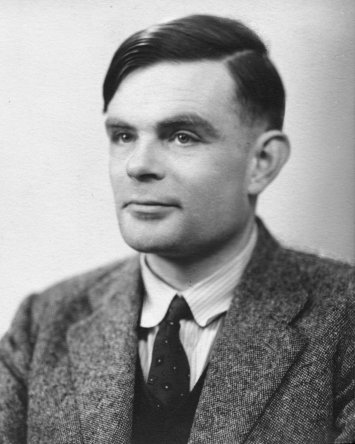A major new movie is released on November 14, called The Imitation Game. It is the story of
the brilliant mathematician and Second World War code breaker, Alan Turing, and
is based on the biography by Oxford mathematics don Andrew Hodges, Alan Turing: The Enigma.
I read this biography over the
summer, and it is a very thorough account of Turing’s life, from his childhood
to his untimely death in 1954. The maths is quite detailed, and at times I kept
up, but sometimes the maths and the logic went a little beyond where I had got
to with ‘A’ level maths and computer science!
Turing was an amazing man who could rightly be called the
inventor of the modern computer. His work at Bletchley Park during the war,
breaking the German Enigma code, saved thousands of lives. Those first
computers that Turing was involved with filled rooms, and yet today there is
far more computing power in our mobile phones. He was a fellow of the Royal
Society, as well as an accomplished long distance runner, who achieved world
class results for his marathon times. He marvelled at the beauty of the world,
and saw wonderful intricacies in nature that would pass many of us by. There is
so much to admire in this man’s life.
Turing’s life ended tragically in 1954, apparently a
suicide. In 1952 he had been tried and convicted for gay sex, and so lost his
security clearance. Homosexual acts are no longer against the law, and Turing was
posthumously awarded a Royal Pardon in 2013. Sadly, his mother died in 1971
without ever knowing about the secret work that he had done during the war,
because it hadn’t yet been declassified.
Even though our laws have changed, there are many men and
women who would feel unwelcome coming into a church today, fearing that the
Christian believers would be judgmental and hostile. This is a very a sad
situation – Jesus never turned anyone away, and he himself was accused (by the religious
people) of hanging around with tax collectors and ‘sinners.’
In September Pauline preached on the story of Zacchaeus, and
challenged us to think about who are the people that we might be excluding
because they are so different to us. This may well be a whole range of people, who
are different for all sorts of reasons: class; race; sexuality; politics or
whatever. As a church we need to think
carefully about how we extend respect and welcome to those who live their lives
differently to us. The gospel is not just for people like us, it is for all the
people in our town, country and world.
For my sabbatical studies I have been looking at the Lord’s
Supper, and throughout my research I have been struck again and again by the
magnetism of Jesus. He was a man who demonstrated God’s love in his life and in
his death. He went to the places that other people wouldn’t go to, he spoke
with and befriended those that the religious establishment would rather ignore:
the lepers; the prostitutes; the collaborators and the terrorists. Jesus had
stern words for the religious: “Woe to you, teachers of the law and Pharisees,
you hypocrites! You shut the kingdom of heaven in men’s faces. You yourselves
do not enter, nor will you let those enter who are trying to.” (Matthew 22.13)
As plans progress for rebuilding the entrance to our
building to make it more welcoming, let’s think as well about our hearts and
minds. How can we be more welcoming as a church?
I remember again the words of
Baptist preacher Billy Graham, who said, “It’s the Holy Spirit’s job to convict.
God’s job to judge, my job to love.”


